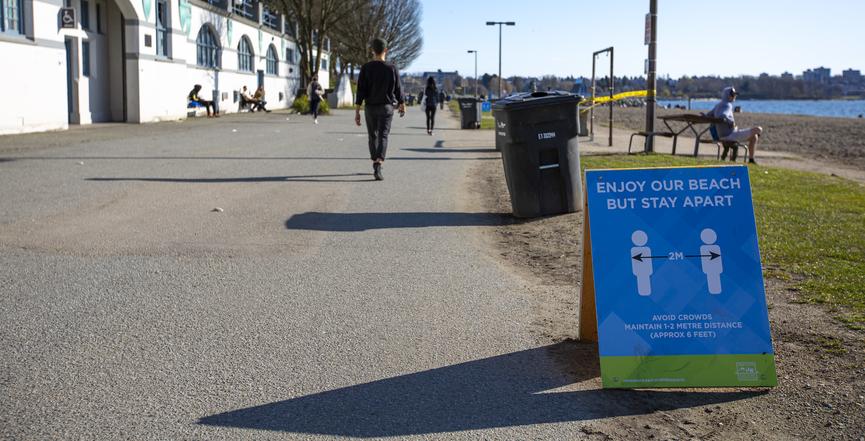Coronavirus has a lot to teach us about social order and the moral nature of our everyday lives. Sociologists, therefore, have special insight about the pandemic.
The coronavirus threat has rapidly produced a new type of social order, one in which people are bound together through new acts of collective solidarity, even if they are practicing “social distancing” or physical distancing. French sociologist Émile Durkheim (1858-1917) provides some helpful ways to think about what is happening to us now.
We may feel as though “social distancing,” or physical distancing, threatens social cohesion and isolates individuals, preventing them from acting together. But this is not how Durkheim would see it. Rather than a breakdown in social contact and further individualization, what we have seen throughout the world is an intensification of social life, as people self isolate and submit to the inconveniences of what may be a prolonged period of quarantine.
This is done out of a sense of obligation and responsibility towards others, as people collectively try to “flatten the curve” — it is a form of collective action that no individual can do on their own. The inner force of this obligation — which we all now feel to a greater or lesser extent — might be termed “the moral code of the pandemic.”
This moral code temporarily invokes new norms of what is acceptable to do and to say. Moral outrage is directed at those who are not taking the pandemic seriously, or who refuse to physically isolate. In some cases, people are called out and shamed publicly for their refusal to abide by collective norms. This points to a sudden strengthening of what Durkheim called the collective conscience, that part of the social community that we carry inside ourselves and which compels adherence to group norms.
This may come as a shock to people more accustomed to acting as individuals, and they may feel that this is a collective overreaction. These sensations are not illogical. They are the product of what Durkheim called “anomie,” that is, an inability to recognize collective norms and obligations, usually because we are too weakly connected to others.
Anomie is not the result of the pandemic, but the pandemic makes it evident in ways it was not before. We live in a culture where we value archetypes and actions that privilege individual freedom over solidarity and collective care.
-
In North America, we live very individualistic lives, and the moral codes of the pandemic require a sudden and rapid shift to a much more intense collective solidarity. This is no doubt jarring for some people, who feel that collective measures are overreacting. Rather than following (“like sheep”) what everyone else is doing, they lean back on other moral codes, like the code of the cowboy, which is sacred in North American culture. The cultural salience of the cowboy as a folk hero in American life is a product of our culture’s intense individualism.
-
In North America, we also like to be our own authorities, and we don’t easily accept the authority of others. Contrary to how science and learning are revered in other cultures, in North America there are deep anti-intellectual and anti-scholastic cultural strains. The unequal access to scientific knowledge and education has left many members of our society with little understanding or respect for the discipline and sacrifice required to become an expert in, say, epidemiology. This has led to the undermining of scientific knowledge and expertise in our society, whether related to climate change, nutrition and food safety, or public health. This distrust of rational authority has also produced a plethora of “folk wisdom” and conspiracy theories that access to knowledge would dispel.
These cultural traits now impede an effective response to the coronavirus outbreak in North America. They helped reduce public preparedness for a crisis like this, but that now can’t be helped. However, if everyone continues to act in individualistic ways, they will now endanger hundreds of thousands of lives in the weeks ahead.
How then can sociology help us fight anomie in the COVID-19 crisis?
First, it is worth recalling that the moral code of the pandemic is a real force. It binds people together through acts of solidarity, and it is possible to strengthen collective conscience by appealing to shared sacrifice. Policymakers would be wise to advise people to act “as if we have the virus,” not in order to protect themselves, but as a sacrifice we make for others. This sacrifice is now sacred, and when we look back upon this moment from the future, our sacrifices will be charged with emotional connectivity.
We also build bonds of solidarity by making sure that everyone is treated fairly. People who believe they are treated unfairly are much less likely to feel any obligation to the group that neglects them. Inequalities (like those between the 1% and the 99%) have to be just, and if they are not, they have to be tackled. This sense of fairness needs to be evident as we try to mitigate the economic effects of the pandemic.
The moral code of the pandemic will restrict individual freedom temporarily, but its effect will stay with us much longer than the pandemic itself. It is a collective force of solidarity that will reckon with acts of libertarianism and neglect, and that can restore social justice, the contours of which will be the subject of struggle in the months and years to come.
Matthew Hayes is a sociologist and Canada research chair in global and international studies at St. Thomas University. His book, Gringolandia: Lifestyle Migration under Late Capitalism (University of Minnesota Press) explores global inequality in the lives of North American migrants to Ecuador.
Image: GoToVan/Flickr




